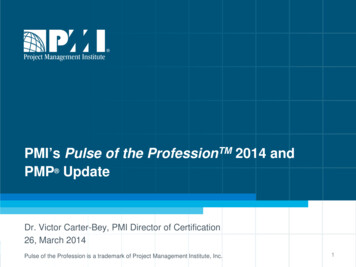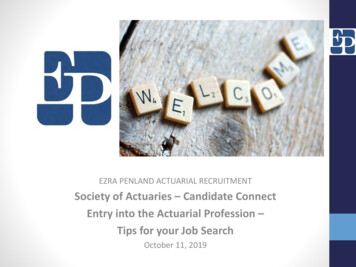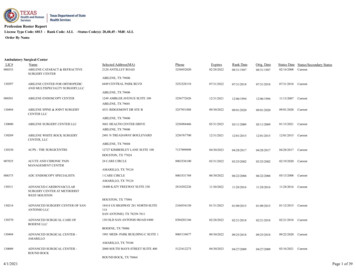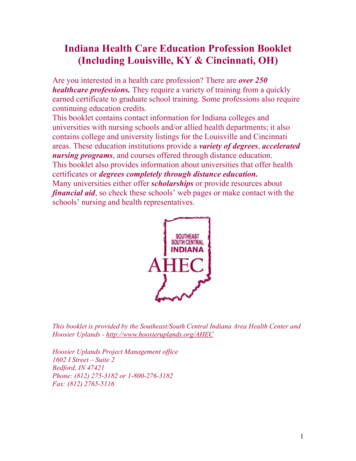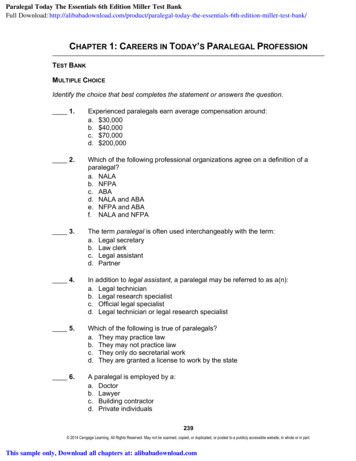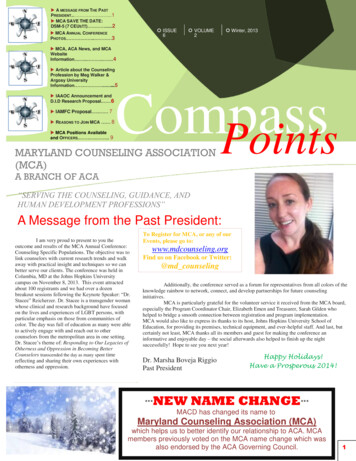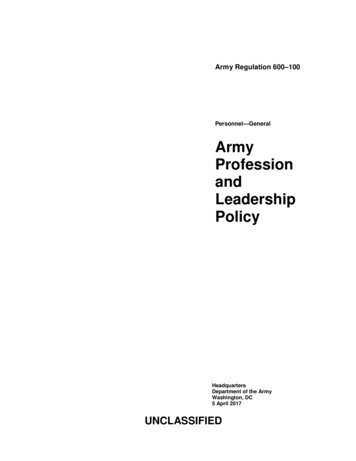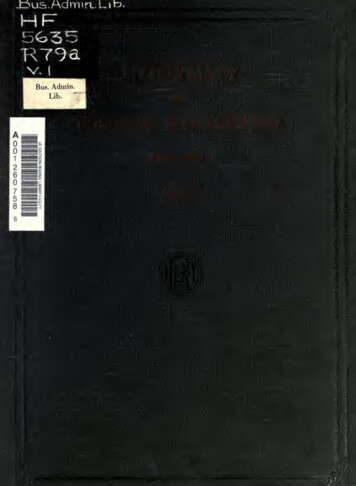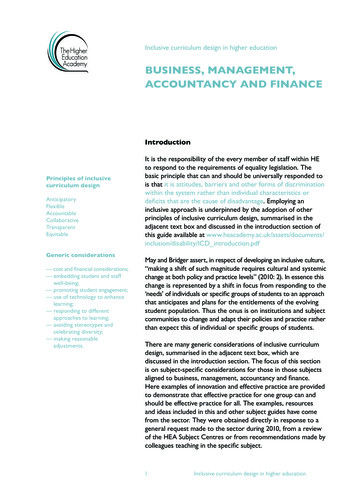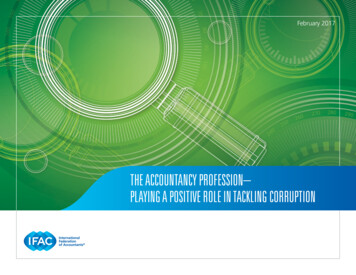
Transcription
February 2017THE ACCOUNTANCY PROFESSION–PLAYING A POSITIVE ROLE IN TACKLING CORRUPTION
PLAYING A POSITIVE ROLE IN TACKLING CORRUPTIONExposure Drafts, Consultation Papers, and other IFAC publications are published by, and copyright of, IFAC.IFAC does not accept responsibility for loss caused to any person who acts or refrains from acting in relianceon the material in this publication, whether such loss is caused by negligence or otherwise.The IFAC logo, ‘International Federation of Accountants ’, and ‘IFAC’ are registered trademarks and servicemarks of IFAC.Copyright February 2017 by the International Federation of Accountants (IFAC). All rights reserved.Written permission from IFAC is required to reproduce, store or transmit, or to make other similar uses of,this document. Contact permissions@ifac.org.ISBN: 978-1-60815-326-82
PLAYING A POSITIVE ROLE IN TACKLING CORRUPTION“The accountancy profession seeks tocreate an ethical framework to assistits members in speaking out when theyidentify fraud and corruption.”– IFAC President Rachel Grimes“Corruption is a severe impediment to sustainable economic,political, and social progress for countries at all levelsof development This underscores the importance ofintensifying efforts to improve governance frameworks andstrengthen actions to improve the prevention, detection,and sanctioning of corruption. Any effort to fight corruptionrequires a holistic and coordinated approach.”– Putting an End to Corruption, Organisation for EconomicCo-operation and Development3
PLAYING A POSITIVE ROLE IN TACKLING CORRUPTIONOver the last two years, IFAC has commissioned the independent Centre for Economics & BusinessResearch (Cebr) to analyze our membership data, and to examine the accountancy profession’s rolein society.The Accountancy Profession—Playing a Positive Role Tackling Corruption is the third report in this seriesand provides a snapshot of the accountancy profession’s role in the global fight against corruption.The first report, Nexus 1: The Accountancy Profession, Behind the Numbers, highlights theimportance of professional accountants to growing economies, and compared the profession’s growthwith total employment growth within regions. The overall picture showed a profession in demand,growing steadily, and making significant contributions to all areas of society.The second report, Nexus 2: The Accountancy Profession—A Global Value-Add, provides a snapshotof the accountancy profession’s economic contribution to the global economy, and to society.4
PLAYING A POSITIVE ROLE IN TACKLING CORRUPTIONFOREWARDThe Accountancy Profession—Playing a Positive Role inTackling Corruption summarizes research into the crucialrole professional accountants play, alongside other keyactors in the economy, to tackle corruption globally.Corruption is among the most harmful and urgentissues facing the world’s citizens today. Among itseffects are a corrosive impact on economic growth thatfrustrates poverty reduction efforts and erodes publictrust in business, government, and the rule of law.The positive role played by accountants worldwide inthe fight against corruption is clear, and professionalismis highlighted as an essential component for success.Professional accountants are one group among anumber of vital actors in the economy, includingbusiness leaders, governments, and the financial sector,that are key to tackling corruption.An increased determination and great deal ofconstructive work in the global fight against corruptionhas been evident in recent years and this momentum isset to continue in 2017. However, this is a never-endingmission, and the problem is age-old. In order to achievemeaningful success, it vital that three things happen: collaborative efforts across all sectors—business,government, and the professions—must beintensified to enact clear organizational governancestandards and whistle-blowing protections for thosewho suspect or identify wrong-doing; given vast public sector spending, global interest inrobust, transparent, and accountable public financialmanagement must be reinvigorated; and to support the public interest, there must be greaterglobal adoption of high-quality internationalstandards on financial reporting, auditing, andethics.In the fight against corruption, silence must never bethe safer option for any individual. The accountancyprofession, acting in the public interest, has supportedthis fight for decades—and we will continue to do so.Fayez ChoudhuryChief Executive Officer, IFAC5
PLAYING A POSITIVE ROLE IN TACKLING CORRUPTIONKEY FINDINGS1.2.CHALLENGES AND OPPORTUNITIESWhere the governance architecture is stronger, the role played byprofessional accountants in tackling corruption is amplified.Working together to strengthen governance and transparency,and combat corruptionProfessional accountants are a part of the governance architecture thatserves to tackle corruption, and their positive contribution is amplified wherethe rest of that architecture is stronger. The link between the prevalence ofprofessional accountants in the workforce and more favorable scores onthe main global measures of corruption is stronger in G-20 countries, andin countries that have adopted anti-money laundering laws in line withinternational recommendations.All key players in the governance architecture of our economies, includingprofessions, business, and government, in both private and public sectors,must collaborate to adopt clear governance standards for all organizations.Improving government accountingPoor government financial management, including cash rather than accrualbased accounting, remains a significant issue in many regions and hasa negative impact on decision making, accountability, and transparency.Adoption of accrual-based accounting, and International Public SectorAccounting Standards (IPSAS ), by all governments and public sectorinstitutions is an urgent priority.Professional accountants are playing a major, positive role in tacklingcorruption, along with other key actors in the global economy.The work of professional accountants is crucial to the governancearchitecture of economies, and along with other key elements serve tounderpin transparency, accountability, and the rule of law. There is a stronglink between the percentage of professional accountants in the workforce,and more favorable scores on the main global measures of corruption.3.Consistent international standardsTo support the public interest, there must be greater global adoptionof high-quality international standards on financial reporting, auditing,and ethics. This includes adoption and implementation, across alljurisdictions, of International Financial Reporting Standards, InternationalStandards on Auditing, the Code of Ethics for Professional Accountants ,issued by the International Ethics Standards Board for Accountants (IESBA ),and IPSAS. These standards have a nexus across integrity in both private andpublic sectors.Professional ethics, education, and oversight—at the core of theglobal accountancy profession—are key to the positive role played intackling corruption.Core qualities that make accountancy a global profession are its robustinternational ethical code, comprehensive educational requirements, andongoing monitoring and oversight mechanisms. The link with more favorablecorruption scores is three times stronger for professional accountants thathave committed to these qualities than for individuals who may identify asaccountants but do not possess professional qualifications (for example, incountries where professional qualifications are not required, or individualsworking in support roles).6
PLAYING A POSITIVE ROLE IN TACKLING CORRUPTIONPLAYING A MAJOR POSITIVE ROLEProfessional accountants are playing a major positive role in tacklingcorruption, along with other key actors in the global economy.Transparency International CorruptionPerceptions Index correlation with %professional accountants in the work force100R2 here is a strong correlation between the proportionof professional accountants in the workforceand a more favorable score on the TransparencyInternational Corruption Perceptions index.1Proportion of members of IFAC member organizations in the workforce isused to approximate the proportion of professional accountants in economies.17
PLAYING A POSITIVE ROLE IN TACKLING CORRUPTIONSTRONGER GOVERNANCE ARCHITECTUREWhere the governance architecture is stronger, the role playedby accountants in tackling corruption is amplified.G-20 Country Transparency International CorruptionPerceptions Index correlation with % professionalaccountants in the work force100Financial Action Taskforce Country TransparencyInternational Corruption Perceptions Index correlationwith % professional accountants in the work force100R2 0%0.40%0.60%0.80%1.00%1.20%1.40%R2 33.0%00.00%1.60%0.50%1.00%1.50%2.00%2.50%The correlation is up to three times stronger in both G-20 countries and countries that have adopted the Financial Action Task Forcerecommendations, the international anti-money laundering and combating the financing of terrorism and proliferation standards.8
PLAYING A POSITIVE ROLE IN TACKLING CORRUPTIONTHE GLOBAL ACCOUNTANCY COREProfessional ethics, education, and oversight—at the core of the globalaccountancy profession—are key to the positive role played in tacklingcorruption.What does professionalism mean in the global accountancy profession?IFAC’s member organizations are professional accountancy organizations thatare committed to:The proportion of professional accountants in the economy—those who havesubscribed to robust ethical, educational, and oversight requirements—is threetimes more strongly linked with more favorable scores on international measures ofcorruption, than for individuals identifying as accountants but who may not haveprofessional qualifications. Quality assuranceBased on labor statistics, Cebr estimates that IFAC member organizations representone third (almost 3 million people) of the global accountancy ecology with theremaining two thirds identified by labor statistics as accountants, or who work in arelated field (see Nexus 2 for further detail). These are people who may work in acountry that does not require professional accountancy qualification, or who workin an accountancy support function. International Public Sector Accounting Standards International Education Standards for professional accountants International Standards on Auditing and related standards Code of Ethics for Professional Accountants Investigation and discipline International Financial Reporting StandardsComparative strength of correlation with favorableTransparency International Corruption Perceptions Index14%There is also a strong correlation (R2 49%)between adoption of the global accountancyprofession’s ethical, educational, and investigationand discipline requirements, and more favorablescores on international measures of corruption.12%10%8%6%4%2%0%% Professional accountants(members of IFAC PAOs)% Accountants generally (including incountries without a qualification andsupport staff)9
PLAYING A POSITIVE ROLE IN TACKLING CORRUPTIONCOMMITTED TO REDUCING CORRUPTIONThe global accountancy profession is committed to its role in tackling corruption.Professions Collaborate to Fight CorruptionSupporting the International CommunityAhead of the Anti-Corruption Summit London 2016,IFAC signed a joint statement deploring corruptionalongside professional accountancy organizations andthe legal fraternity in the United Kingdom.At the March 2016 OECD Anti-BriberyMinisterial Meeting, then IFAC PresidentOlivia Kirtley highlighted an increasinglycomplex and interconnected worldthat requires strong collaboration andcommitment from the private, public, andregulatory communities to fight briberyand corruption.Bribery and corruption represent serious threats toeconomic growth, individual livelihoods, and civilsociety across the world.For many years, professional bodies have workedalongside government, regulators, law enforcement,and international bodies, and supported our membersto combat bribery, corruption, tax-evasion, moneylaundering, and the financing of international terrorism.We will continue this work and provide support tofacilitate national and international cooperation and toimprove monitoring and enforcement systems.The global accountancy profession hasfocused its call to action for the 2016G-20 Leaders’ Summit on trust and integrity,urging steps toward stronger governancein business and the public sector, and acooperative, consistent global regulatoryenvironment.We deplore corruption and the significant harm itcauses; we play a vital role in training, educating, andsupporting our professions to uphold the highest levelsof integrity and ethical standards.We know criminals seek to abuse the services providedby our members to launder the proceeds of corruptionand we are committed to ensuring the professions weserve are armed with the tools to thwart this abuse.We stand united in the fight against corruption in all itsforms and are committed to sharing knowledge, skillsand intelligence with our fellow professionals and withall agencies fighting this cause.10
PLAYING A POSITIVE ROLE IN TACKLING CORRUPTIONCOMMITTED TO REDUCING CORRUPTIONAccountability. Now.Accountability. Now. is a campaign for higherstandards of public sector information around theworld. Its role is to provide a catalyst for change. Itchallenges governments to recognize the importanceof working toward financial reporting that meetsinternational standards.The campaign includes the following initiatives: Building a global coalition by bringingtogether organizations that support improvingtransparency and accountability in the publicsector.Convening International Dialogue toward MoreEffective Regulation, and Restoring
business leaders, governments, and the financial sector, . management must be reinvigorated; and to support the public interest, there must be greater global adoption of high-quality international standards on financial reporting, auditing, and ethics. In the fight against corruption, silence must never be the safer option for any individual. The accountancy profession, acting in the .
